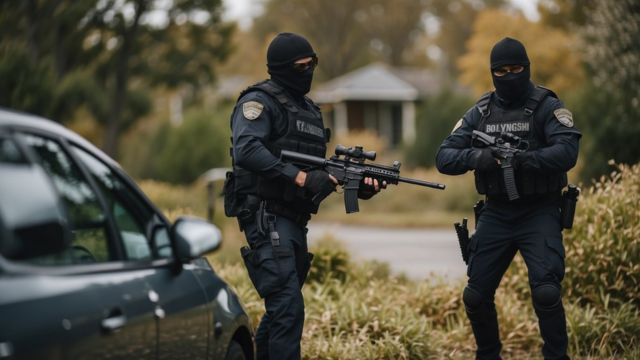The Texas Stand Your Ground law, a critical aspect of self-defense legislation in the state, has garnered attention and sparked debate over the years.
Understanding the intricacies of this law is important for anyone living in Texas or involved in legal matters regarding self-defense.
This article will break down the law’s key points, explore its legal considerations, and explain its practical implications.
What is the Texas Stand Your Ground Law?
The Stand Your Ground law in Texas allows individuals to use force, including deadly force, in self-defense without the duty to retreat when they believe they are facing imminent danger of bodily harm or death. This law applies to situations where a person is in a place where they have a legal right to be, such as their home, workplace, or public spaces. It removes the obligation to attempt to escape a dangerous situation before using force.
In simpler terms, if an individual feels threatened, the law permits them to stand their ground and defend themselves with appropriate force rather than fleeing the scene.
Key Points of the Texas Stand Your Ground Law

- No Duty to Retreat
The most crucial feature of Texas’ Stand Your Ground law is that it eliminates the duty to retreat. In many states, when someone is attacked, they must attempt to retreat from the situation if possible before using force. Texas law, however, allows people to defend themselves even if retreat is an option, as long as they are legally in the place where the encounter occurs. - Use of Deadly Force
The law permits the use of deadly force in situations where an individual reasonably believes they are at risk of serious harm or death. This includes protecting themselves, others, or their property. However, the force used must be proportionate to the threat faced. For instance, a person who is merely pushed or threatened verbally would not be justified in responding with deadly force unless they are in imminent danger. - Protection of Property
Under Texas law, individuals are allowed to use force to protect their property from theft, vandalism, or other criminal activity. The law extends to personal property as well as land and buildings, such as a person’s home or place of business. However, deadly force is generally not justified for property defense unless the person reasonably believes there is a threat to their life or safety. - No Requirement to Retreat in Your Own Home
Texas also has a specific provision known as the “Castle Doctrine,” which is a subset of the Stand Your Ground law. The Castle Doctrine states that an individual has no duty to retreat when they are in their home, regardless of the situation. If someone unlawfully enters a person’s home, they are allowed to use deadly force to protect themselves and their family, without the need to retreat or de-escalate the situation. - Legal Presumptions
Texas law provides a legal presumption that an individual was acting in self-defense in certain situations. For example, if someone is attacked in their home, the law presumes they had a reasonable fear of harm and were justified in using force to protect themselves. However, this presumption can be challenged in court, and the burden of proof lies with the person asserting self-defense.
Legal Considerations and Challenges
A Breakdown of New York Stand Your Ground Law and Its Implications
While the Texas Stand Your Ground law is designed to protect individuals who act in self-defense, it also raises several legal considerations and challenges:
- Reasonable Belief of Imminent Danger
To claim self-defense under the Stand Your Ground law, the person must prove they had a reasonable belief that they were in immediate danger. Courts assess whether the force used was appropriate based on the circumstances. The law does not provide immunity if a person overreacts or uses excessive force in a situation where they were not in immediate danger. - Proportionality of Force
One of the key aspects of this law is proportionality. Deadly force should only be used in situations where it is necessary to prevent serious injury or death. Using excessive force in response to minor threats could result in criminal charges, including manslaughter or even murder. Therefore, a clear understanding of when deadly force is justified is crucial for anyone relying on the Stand Your Ground law. - Potential for Misuse
Critics of the Stand Your Ground law argue that it could be misused or lead to unnecessary violence. In some cases, individuals may invoke the law in situations where a reasonable person would not consider their life to be at risk. This has led to concerns about the law being applied in ways that could escalate violence or disproportionately affect certain communities. - Burden of Proof in Court
If the case goes to trial, the burden of proof often falls on the defendant to show that they acted in self-defense. While the law provides some presumption of self-defense, the defendant must demonstrate that their use of force was reasonable under the circumstances. This can be a complex process involving witness testimony, evidence, and expert analysis. If the court finds the defendant did not act reasonably, they may face criminal charges, including homicide. - Impact on Law Enforcement Investigations
The Stand Your Ground law can also complicate law enforcement investigations. In cases involving the use of deadly force, officers must investigate whether the defendant’s actions were truly self-defense or whether the law was invoked improperly. In some situations, this may lead to lengthy investigations and legal challenges, especially if there are conflicting statements or evidence.
Practical Implications
The practical implications of the Stand Your Ground law in Texas are significant. It means that individuals have the right to defend themselves without the obligation to retreat. However, it also places responsibility on individuals to assess the situation carefully and ensure their response is justified under the law.
For example, someone walking in a parking lot who feels threatened by another person may have the legal right to stand their ground and use force to protect themselves. However, if that person were to use excessive force in response to a non-threatening situation, such as a verbal confrontation, they may find themselves facing criminal charges.
The law has become especially significant in cases of home invasions, carjackings, and confrontations in public places. As incidents of violence increase, many Texans view the law as a safeguard, while others remain concerned about its potential for misuse.
The Texas Stand Your Ground law grants individuals the right to defend themselves without retreating, but it also comes with significant legal responsibilities. Understanding the law’s key points and the legal considerations that accompany its use is crucial for anyone living in Texas. Individuals should be aware that the use of deadly force is only justifiable in specific situations and must always be proportional to the threat faced.
Ultimately, while the law offers protections for those acting in self-defense, it also requires careful consideration and responsible actions to avoid potential legal consequences.

